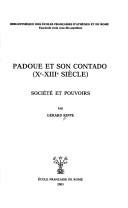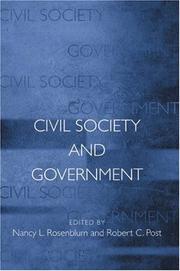| Listing 1 - 4 of 4 |
Sort by
|

ISBN: 272830632X 282182050X 272831005X 9782728306329 Year: 2003 Volume: 317 Publisher: [Rome] : Ecole française de Rome,
Abstract | Keywords | Export | Availability | Bookmark
 Loading...
Loading...Choose an application
- Reference Manager
- EndNote
- RefWorks (Direct export to RefWorks)
L'ouvrage traite d’un objet classique – une cité et son contado – à l’aide des concepts mis au point par l’historiographie récente. Après avoir décrit le cadre territorial hérité de l’Antiquité et du haut Moyen Âge, elle analyse l’évolution de ce territoire et de ses institutions du Xe au XIIe siècle, notamment la naissance et la constitution d’une société féodale à laquelle s’intègrent même les « arimanni » , puis l’« incastellamento » et sa signification démographique et politique, enfin l’émergence de la commune et son évolution vers le podestariat. La seconde partie est dédiée aux campagnes, à l’évolution des rapports de production (notamment par le biais des contrats livellaires), enfin de l’économie rurale. La troisième partie est consacrée au XIIIe siècle, temps de crise : crise des fortunes nobiliaires, des communautés paysannes, des élites urbaines qui doivent intégrer les nouveaux riches. Politiquement, la crise aboutit à la domination d’Ezzelino da Romano (1237-1256). Le XIIIe siècle est « le temps des usuriers », qui se hissent au premier rang de la société ; les rapports de production se transforment (contrats agraires à durée limitée), le paysages aussi. On découvre ainsi les rythmes d’une société dans toute sa complexité.
Cities and towns, Medieval --- Urbanization --- Villes médiévales --- Urbanisation --- History --- Histoire --- Padua (Italy) --- Padoue (Italie) --- Rural conditions --- Conditions rurales --- Feudalism --- Regions & Countries - Europe --- History & Archaeology --- Italy --- Padua (Italy : Province) --- Politics and government. --- Rural conditions. --- Social conditions. --- Villes médiévales --- Medieval cities and towns --- Feudal tenure --- Cities and towns [Medieval ] --- Jusqu'à 1421 --- Civilization, Medieval --- Land tenure --- Land use --- Land use, Rural --- Chivalry --- Estates (Social orders) --- History. --- Padua (Province) --- Feudalism - Italy - Padua (Province) --- Cities and towns, Medieval - Italy - Padua (Province) --- Padoue --- Venise --- Padoue (italie ; région) --- Politique et gouvernement --- Moyen âge
Book
ISBN: 9791036549823 291606334X 9782916063348 Year: 2020 Publisher: Paris : Institut Français de Pondichéry,
Abstract | Keywords | Export | Availability | Bookmark
 Loading...
Loading...Choose an application
- Reference Manager
- EndNote
- RefWorks (Direct export to RefWorks)
En Inde, la psychiatrie ne jouit pas d’une bonne image, et ce, malgré les réformes pour l’acclimater à la situation et à la sensibilité indienne. Si le recours à la psychiatrie est loin d’être négligeable, les déficiences qu’elle présente ne favorisent ni la confiance, ni l’appréhension des désordres psychiques. Ceci laisse une large place à la thérapie religieuse dans laquelle les patients et leurs familles placent leurs derniers espoirs de guérison lors de troubles perçus comme d’origine surnaturelle. Brigitte Sébastia a enquêté dans un sanctuaire catholique dédié à saint Antoine de Padoue, vénéré pour ses pouvoirs thaumaturge et exorciste, où se déroulent d’impressionnantes scènes de possession. À travers une étude très précise, l’auteur explore des problématiques de la société indienne, comme la place du catholicisme et son acclimatation à l’hindouisme, les systèmes thérapeutiques disponibles dans ce pays, les représentations de la maladie mentale et l’impact du contexte social et familial dans l’émergence des troubles psychiques.
Anthropology of religion --- Hinduism --- Exorcism --- Anthony, --- Cult --- India --- Religious life and customs. --- Ethno-anthropology - Religious therapies - Hinduism - Exorcisms - India. --- Evil spirits, Expulsion of --- Expulsion of evil spirits --- Demonology --- Rites and ceremonies --- Religious anthropology --- Ethnology --- Antoine, --- Antoni Padewski, --- Antoni, --- Antonio da Padova, --- Antonio, --- António, --- Antonius, --- Antony, --- Antun, --- Bulhões, Fernando de, --- Bullones, Fernando de, --- Lisboa, António de, --- Martins de Bulhões, Fernando, --- Ontōns, --- Padova, Antonio da, --- Padovas, Ontōns nu, --- Padua, Anthony of, --- Padwy, Antoni z, --- Patavinus, Antonius, --- Anṭūiyūs, --- Anthropology of religion - India --- Exorcism - India --- Anthony, - of Padua, Saint, - 1195-1231 - Cult - India --- India - Religious life and customs --- Anthony, - of Padua, Saint, - 1195-1231

ISBN: 0691088012 0691088020 0691228396 Year: 2002 Publisher: Princeton, N.J. : Princeton University Press ,
Abstract | Keywords | Export | Availability | Bookmark
 Loading...
Loading...Choose an application
- Reference Manager
- EndNote
- RefWorks (Direct export to RefWorks)
Civil Society and Government brings together an unprecedented array of political, ethical, and religious perspectives to shed light on the complex and much-debated relationship between civil society and the state. Some argue that civil society is a bulwark against government; others see it as an indispensable support for government. Civil society has been portrayed both as a independent of the state and as dependent upon it. This book reveals the extraordinary diversity of views on the subject by examining how civil society has been treated in classical liberalism, liberal egalitarianism, critical theory, feminism, natural law, Christianity, Judaism, Islam, and Confucianism. The volume draws on the work of eminent scholars to address six questions: In terms of function and consequences, does it matter where the line is drawn between civil society and the state? What is the relationship of civil society to the state? In what contexts and under what conditions should government interact with individuals directly or instead indirectly through communal associations? What are the prerogatives and duties of citizenship, and what is the role of civil society in forming good citizens? How should a society handle the conflicts that sometimes arise between the demands of citizenship and those of membership in the non-governmental associations of civil society? A theoretical introduction by the editors--political theorist Nancy Rosenblum and legal scholar Robert Post--and a conclusion by religious ethicist Richard Miller, tie the book together. In addition to Rosenblum, the contributors are Kenneth Baynes, David Biale, John Coleman, Farhad Kazemi, John Kelsay, William Galston, Will Kymlicka, Tom Palmer, Fred Miller, Susan Moller Okin, Peter Nosco, Henry Rosemont, Steven Scalet, David Schmidtz, William Sullivan, Max Stackhouse, Stephen White, and Noam Zohar.
Civil society. --- State, The. --- Société civile --- Etat --- Civil society --- State, The --- #SBIB:17H3 --- #SBIB:321H30 --- #SBIB:324H20 --- 400 Overheid --- PPS --- Administration --- Commonwealth, The --- Sovereignty --- Political science --- Social contract --- Politieke wijsbegeerte --- Hedendaagse politieke en sociale theorieën (vanaf de 19de eeuw): algemeen (incl. utilitarisme, burgerschap) --- Politologie: theorieën (democratie, comparatieve studieën….) --- Political science. --- Anabaptism. --- Augustine. --- Benhabib, Seyla. --- Butler, Judith. --- Calvinism. --- Centissimus Annus. --- Constant, Benjamin. --- Cuddihy, John Murray. --- Dignitatis Humanae. --- Durkheim, Emile. --- Elshtain, Jean. --- Evans, Sarah. --- Ferguson, Adam. --- Frankfurt School. --- Friedman, Milton. --- Gaudium et Spes. --- Grotius, Hugo. --- Hardin, Russell. --- Hayashi Shihei. --- Ibn Rusd. --- Itō Jinsai. --- John Paul II (pope). --- John of Viterbo. --- Khatami, Mohammed. --- Kymlicka, Will. --- Leibowitz, Yeshayahu. --- Linbeck, George. --- Lipsius, Justus. --- MacKinnon, Catherine. --- Marsilius of Padua. --- Medina Constitution. --- Neuhaus, Richard. --- Okin, Susan. --- Oldfield, Adrian. --- Pateman, Carole. --- Peale, Norman Vincent. --- Planitz, Hans. --- Plato. --- Pufendorf, Samuel. --- Quadragesinio Anno. --- Rawls, John. --- Roberts v. Jaycees (1984). --- Sadanobu, Matsudaira. --- Saint Ambrose. --- authoritarianism, in Islamic world. --- casuistry. --- city-state: aim of (Aristotle). --- corporatism. --- institutions: in civil society. --- pluralism, of civil society. --- revolution (Locke). --- Civil government --- Government --- Political theory --- Political thought --- Politics --- Science, Political --- Social sciences
Book
ISBN: 3781559521 3781525171 Year: 2022 Publisher: Bad Heilbrunn Verlag Julius Klinkhardt
Abstract | Keywords | Export | Availability | Bookmark
 Loading...
Loading...Choose an application
- Reference Manager
- EndNote
- RefWorks (Direct export to RefWorks)
In recent decades, historical educational research has developed into a field of research and work that is multifaceted in its topics, methods, and theoretical references and is interdisciplinary. The methods, working techniques, and tools of the digital humanities, which influence many areas of the humanities and cultural studies today, are also already being applied there in a variety of ways. This volume demonstrates this with concrete examples from current research projects and working groups related to historical education research. The contributions give examples of the application of selected digital tools and research methods and put research-practical as well as epistemological questions up for discussion. Historische Bildungsforschung hat sich in den letzten Jahrzehnten zu einem Forschungs- und Arbeitsgebiet entwickelt, das in seinen Themen, Methoden und theoretischen Bezügen vielseitig aufgestellt und interdisziplinär anschlussfähig ist. Auch Methoden, Arbeitstechniken und Tools der Digital Humanities, die viele Bereiche der Geistes- und Kulturwissenschaften heute beeinflussen, finden dort bereits in vielfältiger Weise Anwendung. Dies zeigt der vorliegende Band anhand konkreter Beispiele aus aktuellen Forschungsprojekten und Arbeitsgruppen mit Bezug zur historischen Bildungsforschung. Die Beiträge geben Anwendungsbeispiele für ausgewählte digitale Werkzeuge und Forschungsmethoden und stellen forschungspraktische wie auch epistemologische Fragen zur Diskussion.
History of education
---
Historische Bildungsforschung; Digitalisierung; Digitale Medien; Technologische Entwicklung; Bildungsgeschichte; Computerunterstütztes Verfahren; Historische Quelle; Quellensammlung; Digitale Informationsspeicherung; Analyse; Grundwissen; Wissenschaftsforschung; Erziehungswissenschaft; Online; Modellierung; Computerlinguistik; Schulbuch; Schulgeschichte; Pädagogische Zeitschrift; Religionsunterricht; Frau; Studium; Methodologie; Kollaboration; Schule; Archiv; Open Access; Hochschulgeschichte; Forschungsdaten; Prosopografie; Vernetzung; Hochschule; Geisteswissenschaften; Student; Daten; Wirtschaftsgeschichte; Humankapital; Literatur; Erinnerung; Zeitgeschichte; Karte; Kollektives Gedächtnis; Holocaust; Lernen; Sexualaufklärung; Fotografie; Soziales Netzwerk; Website; Informationsangebot; Elektronische Datenverarbeitung; Mediengeschichte; Stapfer, Philipp Albert; Mollenhauer, Klaus; 17. Jahrhundert; 18. Jahrhundert; 19. Jahrhundert; 20. Jahrhundert; 21. Jahrhundert; Nationalsozialismus; Deutschland
| Listing 1 - 4 of 4 |
Sort by
|

 Search
Search Feedback
Feedback About UniCat
About UniCat  Help
Help News
News